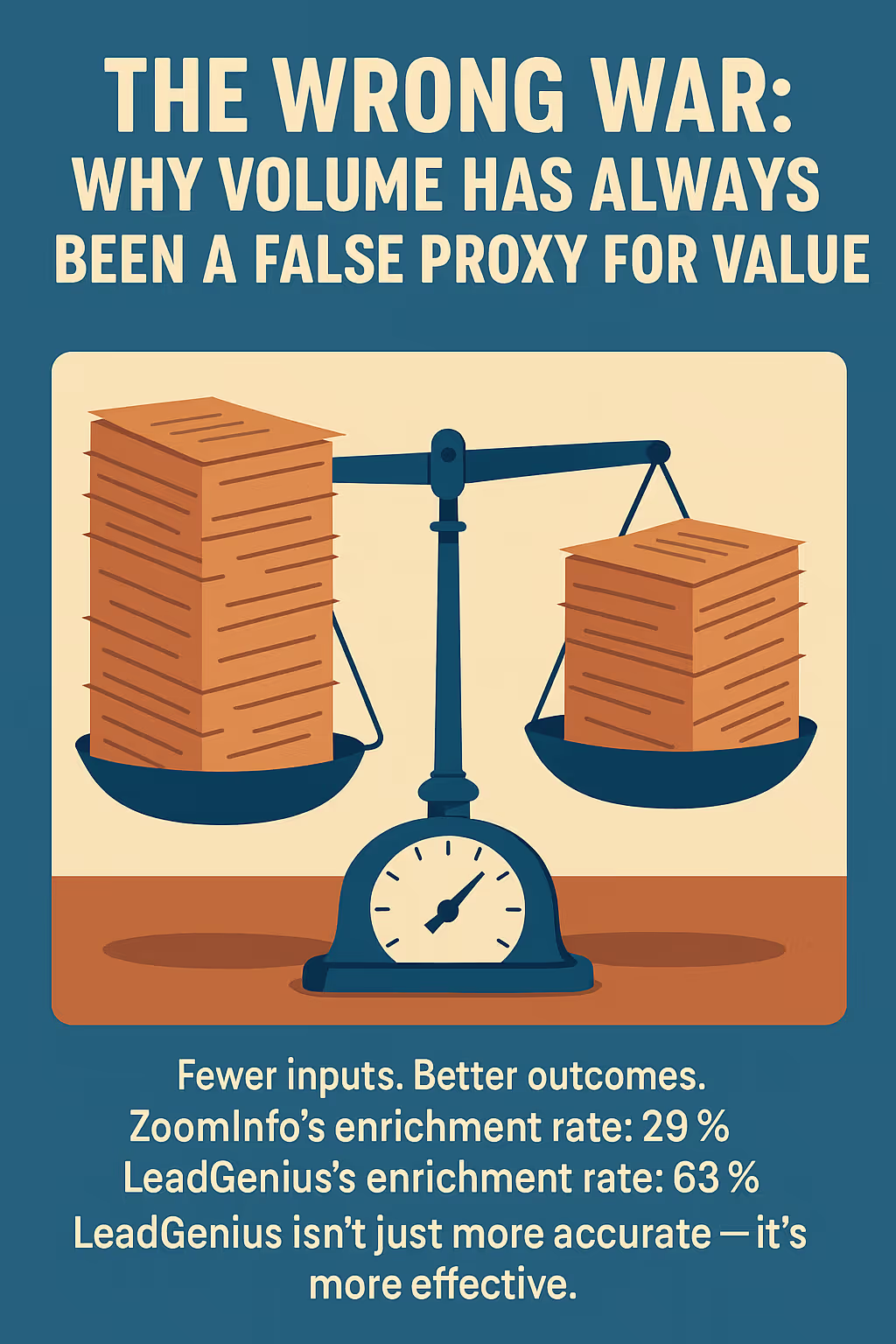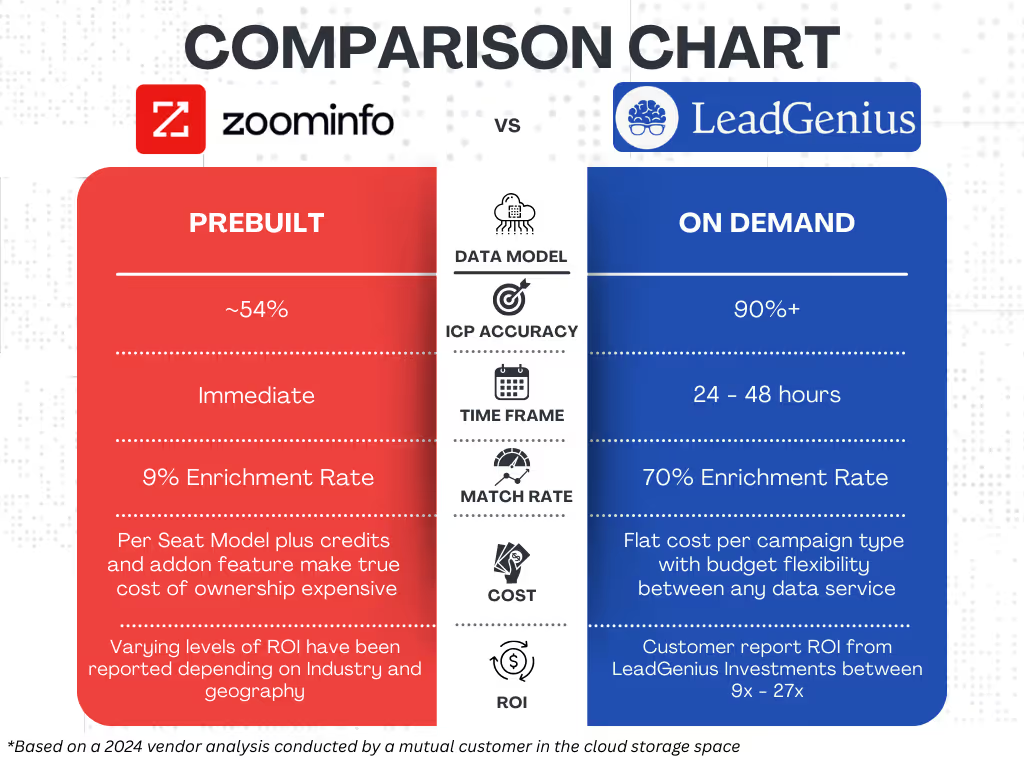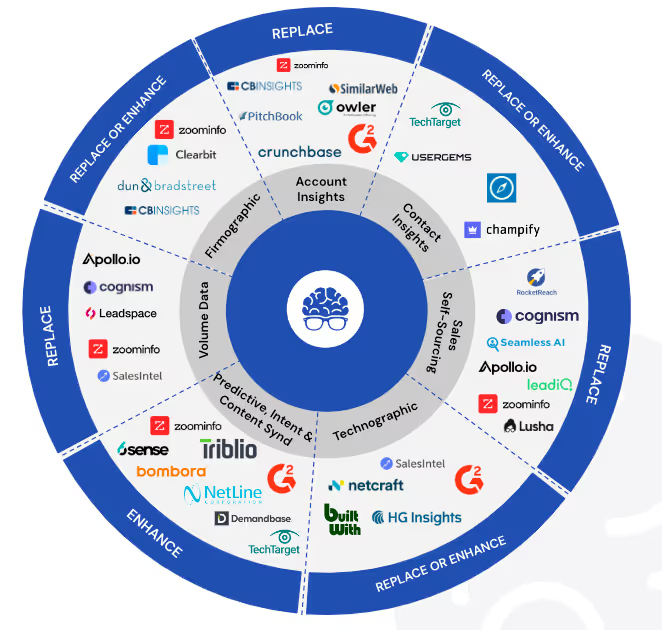Every few years, we collectively fall for the same trick.
We confuse price with cost.
We confuse coverage with reach.
We confuse volume with value.
It’s a pattern that plays out across industries. Fast fashion, fast food, fast data. On the surface, the economics make sense: cheaper inputs, higher margins. But scratch a little deeper, and the hidden costs start to surface — in quality, in performance, in outcomes.
Nowhere is this more apparent than in the business of B2B data.
For years, ZoomInfo has been the de facto name in contact databases. The brand is ubiquitous. The pitch is simple. Millions of records, a low cost per contact, and a UI that’s become a rite of passage for every junior SDR.
But increasingly, that promise is starting to crack. Quietly, and now not so quietly, companies are beginning to ask the question: What is the real cost of using bad data at scale?
And when they do, they find their way to LeadGenius.
The Wrong War: Why Volume Has Always Been a False Proxy for Value

Let’s start with what everyone sees.
ZoomInfo gives you a lot of data. No one disputes that. But it’s what kind of data — and what you can do with it — that makes all the difference.
According to a recent side-by-side analysis from a publicly traded tech company in Seattle, ZoomInfo managed to enrich only 29% of 96,000 brand records. LeadGenius, by contrast, successfully enriched 63% of just 35,000 records.
Fewer inputs. Better outcomes.
ZoomInfo’s enrichment engine depends largely on scraped LinkedIn profiles and browser plugin telemetry. It’s a factory floor model: prebuilt, rigid, and highly U.S.-centric. That works—until it doesn’t. Until you start looking globally. Or in the long tail of sub-200 employee businesses. Or inside verticals where the sellers don’t look like traditional companies.
LeadGenius wins because it isn’t a factory. It’s a lab.
It doesn’t serve the same 10 million stale records to every customer. It builds bespoke data for each customer — based on your industry, your GTM strategy, and your actual ICP. It combines real-time scraping, machine learning, and a global workforce of native-language researchers in 37 countries.
The result? 70% enrichment rates. 90% data accuracy.
And a 31% higher conversion rate on outbound.
The punchline is brutal but honest:
LeadGenius isn't just more accurate. It’s more effective.
The Global Mirage: How “International Coverage” Became a Tagline, Not a Capability
ZoomInfo claims global coverage. So do many of its competitors. But if you’ve ever tried running international campaigns using off-the-shelf data, you know how misleading that claim can be.
Because here's the secret: most of those “global contacts” are scraped English-language LinkedIn profiles.
Try running an ABM campaign in the DACH region using LinkedIn-only data. Or launching in Southeast Asia with titles translated poorly from English. Or mapping ecommerce growth in Brazil using US-centric firmographics.
Global coverage doesn’t mean “our database has entries from other countries.”
It means:
- You understand local privacy law (think GDPR, LGPD, POPIA)
- You have native-language research capability
- You can differentiate a reseller in Spain from a B2B marketplace seller in Mexico
- You don’t lose all your coverage the moment LinkedIn restricts scraping
LeadGenius isn’t guessing at this. It built data infrastructure — not slides — in 37 countries. Regional scraping pipelines. Language-specific prompts. Market-specific data sourcing.
That’s what global actually looks like.
The Downmarket Black Hole: Where ZoomInfo Data Disappears
The mid-market and SMB ecosystem is where the real mess begins.
Sub-200 employee businesses account for the majority of new logos in SaaS and tech-led GTM strategies. They're fast-moving, less bureaucratic, and often more responsive to outbound.
And yet, these are exactly the companies that ZoomInfo fails to track meaningfully. Why?
Because these businesses:
- Don’t have robust LinkedIn footprints
- Don’t show up in registry-based firmographics
- Don’t use job titles in any standardized way
- Frequently operate across ecommerce, creator-led, or fragmented verticals
LeadGenius wins here because it doesn't depend on a company existing in a static database. It creates visibility where there is none.
Want a list of Amazon marketplace sellers doing $1M+ in the Home Goods category?
Want to track Shopify merchants with high traffic but no outbound contact points?
Want to find sub-200 employee manufacturers in Eastern Europe hiring for logistics engineers?
ZoomInfo can’t help you.
LeadGenius was built for it.
Ecommerce Isn’t a Vertical. It’s a Shadow Economy.
Here’s something most data providers still don’t get:
Ecommerce companies don’t behave like traditional businesses.
Their digital footprint is splintered.
Their operator might be an influencer.
Their contact info might be a Gmail.
Their fulfillment model might live on Amazon FBA or ShipBob.
To ZoomInfo, these sellers are ghosts.
To LeadGenius, they’re signals.
LeadGenius can identify:
- Amazon storefront aliases and match them to LLCs
- Instagram handles tied to DTC product lines
- Shopify plugins used for fulfillment and payment
- Customer review velocity to estimate merchant performance
- Business owners behind Gmail accounts from form fills
Ecommerce is fragmented, decentralized, and full of alias-based identity structures. LeadGenius doesn’t see that as a blocker — it sees it as a feature.
If ZoomInfo was built for the Fortune 500, LeadGenius was built for the next 50,000.
Leased Data, Lost Leverage
There’s a final point — one that rarely makes it into pricing discussions, but should be front and center in any risk-adjusted ROI model.
When you stop paying ZoomInfo, you lose access to your data.
That’s because the data is leased, not owned.
LeadGenius delivers data you keep.
It’s a simple distinction with enormous consequences. For compliance. For continuity. For CRM architecture. For institutional knowledge. For GTM alignment.
In a world where revenue teams rotate every 18 months, the ability to retain and own your outbound data isn’t a nice-to-have.
It’s survival.
The Quiet Revolution: Real ROI, Not Vanity Metrics
There’s a reason the smartest GTM teams in tech — from Amazon to SAP to TikTok Shop — are ditching the ZoomInfo model.
Because they’ve realized that "cheap data" is just expensive inefficiency in disguise.
LeadGenius doesn’t promise the biggest database. It promises the right data.
For the right use case. At the right moment. With the right signals.
It’s not just a contact vendor. It’s a custom data engine — one that adapts to your vertical, your ICP, and your global ambition.
And in a world drowning in noise, that’s not just useful.
It’s unbeatable.




